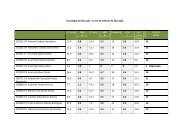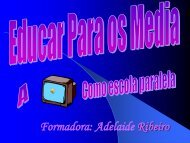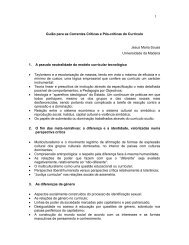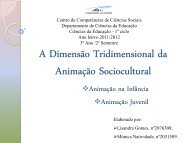Teoria e Desenvolvimento Curricular
Teoria e Desenvolvimento Curricular
Teoria e Desenvolvimento Curricular
You also want an ePaper? Increase the reach of your titles
YUMPU automatically turns print PDFs into web optimized ePapers that Google loves.
3ATEE-RDC19 (SNOEK, M. et al.). (2003). Reflections on Trends in Teacher Education in EuropeUsing the Scenario Perspective. European Journal for Teacher Education, 26 (1), 137-142.ATEE-RDC19 (SNOEK, M. et al.). (2003). Scenarios for the Future of Teacher Education in Europe.European Journal for Teacher Education, 26 (1), 21-36.BAUDELOT, C., & ESTABLET, R. (1971). L’école capitaliste en France. Paris : PUF.BENJAMIN, H. (1977). The curriculum: context, design and development. Edinburgh: Oliver andBoyd.BERNSTEIN, B. (1975). Class, codes and control. Londres: Routledge and Kegan Paul.BEYER, L., & LISTON, D. (1996). Curriculum in conflict: social visions, educational agendas andprogressive school reform. New York: Teachers College Press.BLOOM, B. S., & outros (1956). Taxonomy of educational objectives. New York: Longmans.BOBBIT, F. (1918). The curriculum. Boston: Houghton Mifflin.BOURDIEU, P., & PASSERON, J.-C. (1975). A reprodução. Rio de Janeiro: Francisco Alvez.BOWLES, S., & GINTIS, H. (1976). Schooling in capitalist America. New: York: Basic Books, Inc.,Publishers.BRUNER, J. (1966). Toward a theory of instruction. New York: W. W. Norton & Comp.CARR, W., & KEMMIS, S. (1988). Teoría crítica de la enseñanza. Barcelona: Martínez Roca.COMBS, A. W., & outros (1974). The professional education of teachers: a humanistic approach toteacher preparation. Boston: Allyn and Bacon, Inc.D’HAINAUT, L. (1977). Educação: dos fins aos objectivos. Coimbra: Almedina.DEWEY, (1916). Democracy and education. New York: MacMillan Publishing Co., Inc.DOLL, W. (1993). A post-modern paradigm on curriculum. New York: Teachers College Press.ESTEVE, J. M. (1991). O mal-estar docente. Lisboa: Escher.ESTRELA, A. (1999). O tempo e o lugar das Ciências da Educação. Porto: Porto Editora.FINO, C. M. & SOUSA, J. M. (2002). O Manifesto para a Educação da República: avaliar o sistemaeducativo no “tribunal” da praça pública? In J. A. COSTA, A NETO-MENDES, & A. VENTURA(Orgs.). Avaliação de Organizações Educativas. (pp. 93-102). Aveiro: Universidade de Aveiro.FINO, C. M. & SOUSA, J. M. (2003). As TIC redesenhando as fronteiras do currículo. RevistaGalego-Portuguesa de Psicoloxía e Educación, 8 (10), 2051-2063.FORMOSINHO, J. (1987). Currículo uniforme, pronto-a-vestir de tamanho único. in O insucessoescolar em questão. Braga: Universidade do Minho.FREIRE, P. (1975). Pedagogia do oprimido. Porto: Afrontamento.GIMENO SACRISTAN, J. (1981). <strong>Teoria</strong> de la enseñanza y desarrollo del curriculo. Salamanca:Anaya 2.GIROUX, H., & SIMON, R. (1995). Cultura popular e pedagogia crítica: a vida cotidiana como basepara o conhecimento curricular. In A. F. MOREIRA, & T. T. SILVA. (Orgs.). Currículo, cultura esociedades. (pp. 93-124). São Paulo: Cortez.GOODLAD, J. I., & outros (1979). Curriculum inquiry: the study of curriculum practice. New York:McGraw-Hill.HARGREAVES, A. (1998). Os professores em tempos de mudança. O trabalho e a cultura dosprofessores na idade pós-moderna. Lisboa: McGraw Hill.HARROW, A. J. (1972). A taxonomy of the psychomotor domain. New York: David McKay Comp.JOYCE, B., & WEIL, M. (1980). (1972). Models of teaching. New Jersey: Prentice-HallKELLY, A. V. (1981). O currículo: teoria e prática. São Paulo: Harbra.


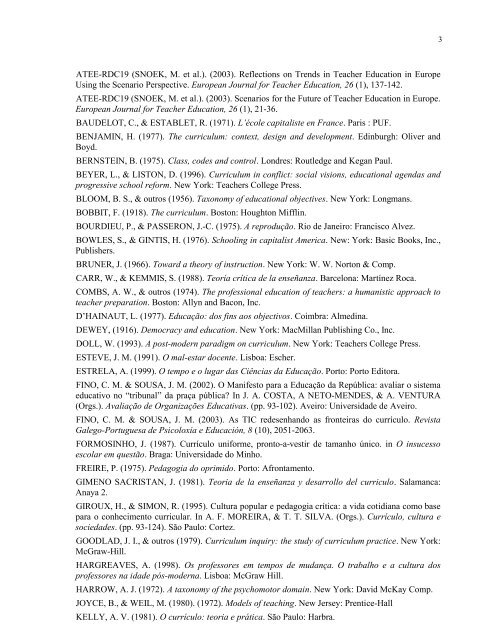
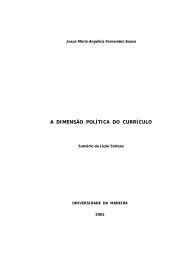
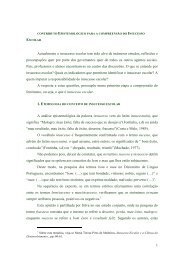
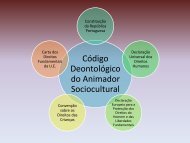
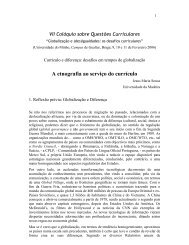
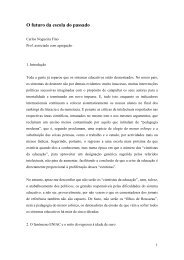
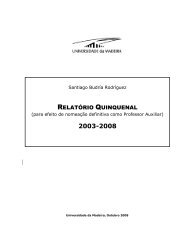
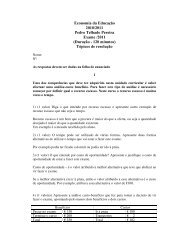
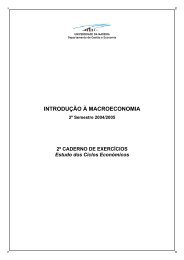
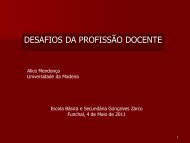
![Estudos Correlacionais [Modo de Compatibilidade]](https://img.yumpu.com/43647854/1/190x134/estudos-correlacionais-modo-de-compatibilidade.jpg?quality=85)
